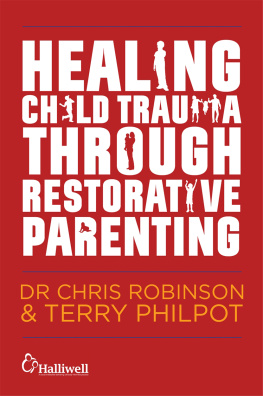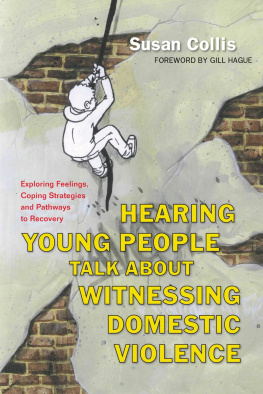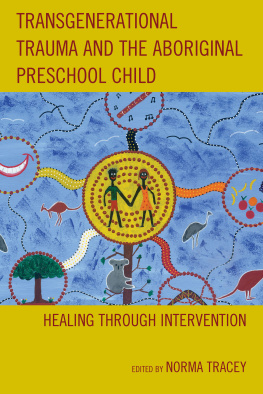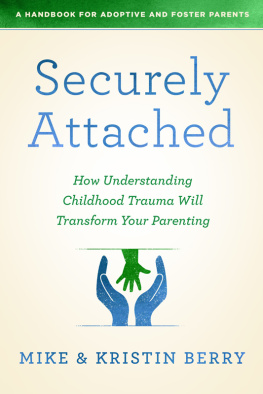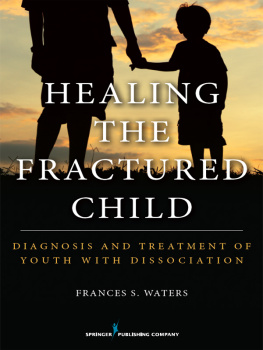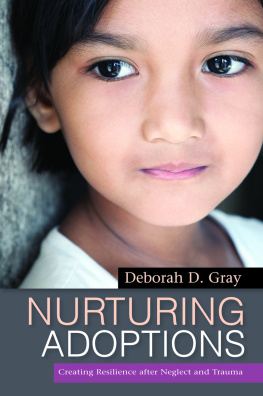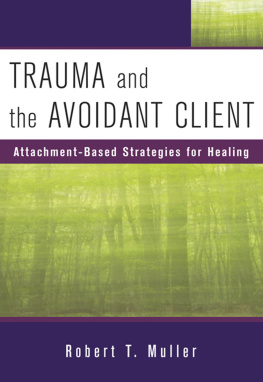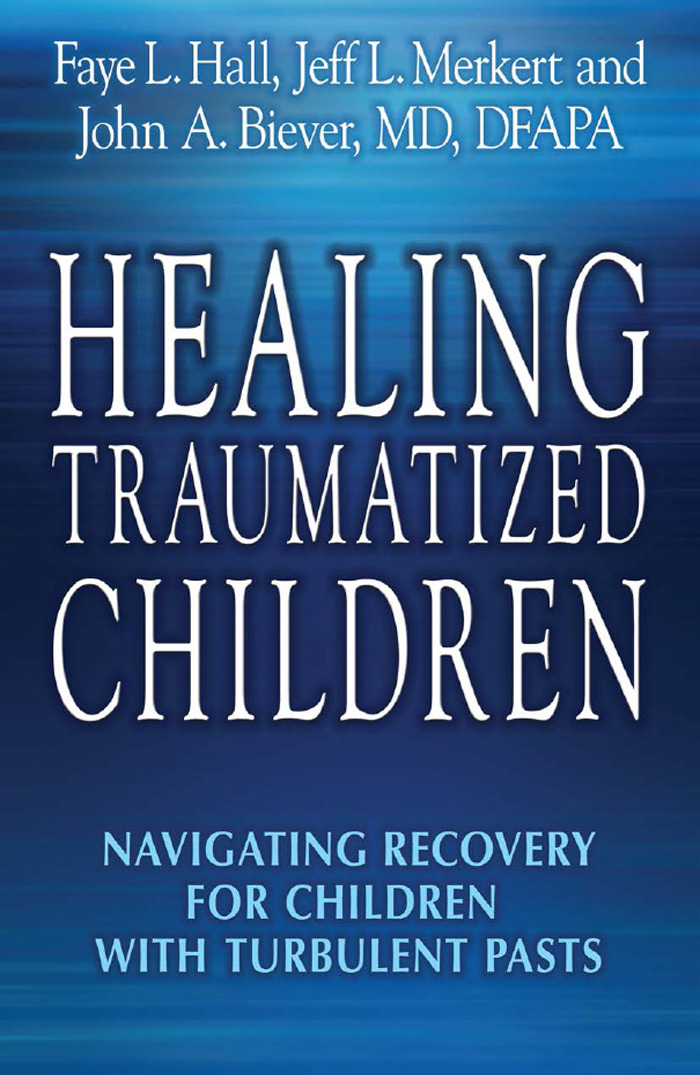

Copyright 2015 by Faye L. Hall, Jeff L. Merkert and John A. Biever, MD, DFAPA
All rights reserved. No portion of this book may be reproduced or transmitted in any form whatsoever, including electronic, mechanical or any information storage or retrieval system, except as may be expressly permitted in the 1976 Copyright Act or in writing from the publisher.
Requests for permission should be addressed to:
New Horizon Press
P. O. Box 669
Far Hills, NJ 07931
Faye L. Hall, Jeff L. Merkert and John A. Biever, MD, DFAPA
Healing Traumatized Children:
Navigating Recovery for Children with Turbulent Pasts
Cover design: Charley Nasta
Interior design: Scribe Inc.
Library of Congress Control Number: 2014950534
ISBN-13 (eBook): 978-0-88282-496-3
New Horizon Press
19 18 17 16 15 1 2 3 4 5
AUTHORS NOTE
T his book is based on the authors research, personal experiences, interviews and real life experiences. In order to protect privacy, names have been changed and identifying characteristics have been altered except for contributing experts.
For purposes of simplifying usage, the pronouns his/her and s/he are sometimes used interchangeably. The information contained herein is not meant to be a substitute for professional evaluation and therapy with mental health professionals.
TABLE OF CONTENTS
Guide
O ften, much too often, families are challenged in the most complex and pervasive manner by relational trauma and attachment disturbances or disruptions that leave all family members mistrustful of each other and of the professionals who attempt to guide, support and help them to heal. Often, much too often, professionals focus on the behaviors of the parent or child that need to change, without understanding the roots of these behaviors, which often are the reasons that these behaviors are so resistant to change. Too often these behavioral strategies are not utilized by professionals who are trained in trauma and attachment or who are using strategies that are not congruent with this training. When relational trauma and insecure attachments prevent any semblance of safety for family members, there is little likelihood that they will have sufficient motivation and ability to try something new that is resting on a foundation of fear, isolation and shame.
All families exposed to significant trauma and attachment problems must first heal if they are to then begin the difficult but very rewarding process of developing the relational and developmental competencies needed if the family is to survive and even thrive. Healing Traumatized Children, by Faye Hall, Jeff Merkert and Dr. John Biever, presents a model of parenting and intensive family interventions that is based on central theories and research involving trauma and attachment. These interventions require a complex understanding of each unique parent, child and relationship along with sensitive, multidimensional responses to the current environment and its roots in the past.
The authors have developed an Emotional Cognitive Trauma Model of intervention that integrates the theories that are critical in family disorganization and mistrust and provides a guide for a practice that may lead to healing and restorative change, while being detailed and comprehensive. This model was developed as a wraparound program for very challenged families which were at risk for having the children placed outside their homes. It also has great relevance for the outpatient treatment of families whose challenges are less severe.
The authors do not pretend that helping families with pervasive problems will be easy. They ask a great deal of parents, but they ask this with empathy for how hard it is and with an attitude of compassion that avoids shaming and blaming. They provide guidance, with many practical ideas and resources along with a great degree of support. They help parents to feel safe by communicating an attitude that conveys confidence and hope, assuming that the parents have good intentions and appropriate goals for their children. Initially, they focus with parents on helping them to understand and develop their relationships with each other and their children. They then assist parents to develop their emotional and cognitive skills in a manner that will strengthen and heal rather than cause divisiveness and despair.
Hall, Merkert and Biever also help us all to see the importance of adopting a trauma lens to hold our perceptions of the behavior of both children and their parents. They give many examples of how our behavior interventions will change when we acknowledge the role of trauma in the development of troublesome behaviors. They equally show us how crucial it is to understand the negative internal working model of self and other held by many children who have experienced trauma and who have insecure attachments.
Often, we, as adults, forget that the deep safety that comes from a committed relationship with our partner is based on having confidence that the relationship is for better or worse. This frequently-heard phrase indicates that the relationship is bigger, stronger, and will outlast any particular conflict, disagreement or separation. The safety that comes from this conviction enables parents to address their relational problems rather than deny them and then to face them with the goal of improving the relationship rather than winning the conflict or hurting their partners.
Many traumatized children with significant attachment insecurities do not assume that their relationships with their parents are for better or worse. Lacking safety that the relationship is strong enough to handle a conflict, they react with deceit, rage, withdrawal or fear, avoiding the engagement needed to address and resolve a family problem. First and foremost, it is the task of the parents to convey that the relationship is for better or worse and Well get through this together. At the same time, the first task of the professional is to help parents develop their own sense of safety so that they can acknowledge their challenges and develop their competencies.
Because these children have experienced relational trauma, the authors stress the need to use nurturing actions which far exceed the norm. Love, care, intimacy, touch and affection must occur every day and not be dependent on good behavior. This core concept might well evoke a sense of Of course that is the case if these children are going to learn to trust. Regretfully, such guidance is often not stressed or even acknowledged in many intensive family treatment and support programs. Too often the primary emphasis is on behavioral consequences, without addressing the core sense of isolation, fear and shame that the children often experience, and have for years, prior to the development of their problems.
In short, this is a challenging book, full of important and creative understandings and interventions, needed to work with highly challenged, and challenging, families. There is no quick fix here, but there is a strong, comprehensive and integrated model for family interventions. Hope lies within this book but we need to see the importance of giving careful thought and sensitive engagement to each unique family that has lost its way in providing its members with the experiences of safety, comfort and joy.


